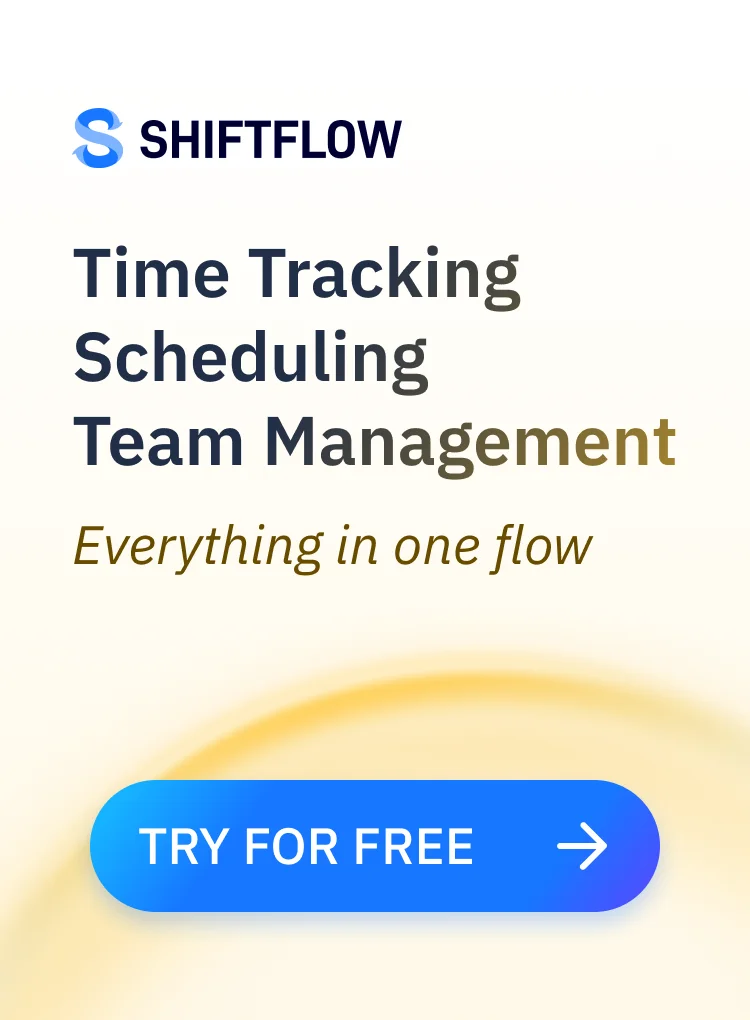What Is Working Off the Clock and Is It Legal?
Learn what working off the clock means under FLSA, common examples (pre-shift prep, post-shift cleanup, unpaid training, working through breaks), why it violates federal wage laws, employer liability ($200M+ in annual penalties), and how to prevent unauthorized unpaid work.

What Does Working Off the Clock Mean?
Working off the clock means performing job-related duties without recording the time or receiving compensation. This includes any work-related activity that employees perform before clocking in, after clocking out, during unpaid breaks, or outside scheduled work hours without proper time tracking—all of which violate the Fair Labor Standards Act (FLSA) for non-exempt employees.
The FLSA requires employers to compensate employees for all hours worked, regardless of whether time was formally recorded. Allowing or requiring employees to work off the clock creates liability for unpaid wages, overtime violations, penalties, and potential liquidated damages.
Quick Answer
Working off the clock is performing job duties without recording time or receiving pay. It violates the FLSA, creates employer liability for back wages and penalties, and affects non-exempt employees who must be paid for every hour worked.
According to U.S. Department of Labor enforcement data, wage and hour violations including off-the-clock work result in over $200 million in annual back wage collections. Retail, food service, and healthcare industries account for the majority of violations.
What Are Common Examples of Working Off the Clock?
Pre-Shift Work
Typical scenarios:
- Arriving early to prepare: Setting up workstations, organizing supplies, or counting inventory 15–30 minutes before scheduled shift
- Pre-opening tasks: Unlocking doors, turning on equipment, brewing coffee, or preparing for opening
- Uniform preparation: Changing into required uniforms or protective equipment before clocking in
- Meeting attendance: Required pre-shift huddles or briefings before time clock access
Example: Restaurant server arrives at 4:45 PM to set up tables, roll silverware, and prepare section but doesn’t clock in until scheduled 5:00 PM start time. Those 15 minutes are compensable working time.
Post-Shift Work
Typical scenarios:
- Closing duties: Cleaning workstations, securing cash registers, taking out trash after clocking out
- Equipment shutdown: Turning off machinery, covering equipment, or locking up after recorded shift ends
- Paperwork completion: Filling out reports, balancing cash drawers, or completing time sheets after clocking out
- Handoff tasks: Briefing incoming shift workers on issues or pending tasks
Example: Retail associate clocks out at 9:00 PM but spends 20 minutes counting register, completing closeout paperwork, and setting alarm before leaving. That 20 minutes must be compensated.
Working Through Breaks
Meal break violations:
- Interrupted lunches: Being called to help customers or answer questions during 30-minute unpaid meal break
- Working lunches: Eating at desk while monitoring phones or responding to emails during unpaid break
- On-call breaks: Remaining available and responding to work needs during unpaid meal period
Under FLSA, meal breaks lasting 30+ minutes can be unpaid only if employees are completely relieved of all duties. Any work performed during unpaid breaks must be compensated.
Organizations should review policies on voluntary time off to ensure break periods are genuinely unpaid and duty-free.
Off-Hours Work
After-hours violations:
- Email and text responses: Answering work emails, messages, or calls from home during non-work hours
- Remote work: Logging in from home to finish tasks without recording time
- On-call availability: Being required to respond to work needs during off-hours without compensation
- Travel time: Work-related travel outside scheduled hours not properly recorded
Example: Hourly employee receives work emails from 7:00–8:00 PM nightly and responds from home. That hour per day (5 hours weekly) is compensable work time, potentially creating overtime liability.
Mandatory Training and Meetings
Training violations:
- Unpaid training sessions: Required attendance at training, workshops, or certification programs without compensation
- Mandatory meetings: Staff meetings, safety briefings, or company announcements held off-the-clock
- Orientation programs: New hire orientation or onboarding activities not recorded as work time
Training is compensable under FLSA unless it meets all four criteria: outside regular hours, voluntary attendance, not job-related, and no productive work performed. Most mandatory training fails these tests.
Organizations offering on-the-job training must ensure proper time tracking and compensation.
Why Is Working Off the Clock Illegal?

FLSA Requirements
Fair Labor Standards Act mandates:
- All hours worked must be compensated: Employees must receive at least minimum wage for every hour worked
- Accurate record-keeping: Employers must maintain accurate time records showing actual hours worked
- Overtime requirements: Non-exempt employees receive time-and-a-half after 40 hours per week
- No “volunteer” work: Employees cannot volunteer services to for-profit employers
The “Suffered or Permitted to Work” Standard
Under FLSA, work includes any activity an employer suffers or permits an employee to perform, even if:
- The employer didn’t request the work
- The work was performed outside scheduled hours
- The employer instructed employees not to work off the clock
- The employee failed to report the time
Employer knowledge: If the employer knows or reasonably should know employees are working off the clock, the time is compensable regardless of whether it was authorized.
Why Intent Doesn’t Matter
“I didn’t know they were working off the clock” is not a defense. Employers are responsible for:
- Implementing systems to prevent off-the-clock work
- Training managers to recognize and stop off-the-clock work
- Paying for all work performed, even if unauthorized
- Disciplining employees who violate time recording policies (while still paying for the time worked)
Organizations managing mandatory overtime should be especially vigilant about proper time recording.
What Is Employer Liability for Off-the-Clock Work?

Back Wages
Primary liability: Employers must pay all uncompensated wages for work performed off the clock, typically covering:
- 2 years: Standard statute of limitations for unintentional violations
- 3 years: Extended period for willful violations
Calculation example:
Employee worked 30 minutes off-the-clock daily for 2 years:
- Daily uncompensated time: 0.5 hours
- Weekly uncompensated time: 2.5 hours
- Annual uncompensated time: 130 hours
- Hourly rate: $15/hour
- Back wages owed: 260 hours × $15 = $3,900
If those 2.5 weekly hours created overtime (pushing total over 40 hours), the rate increases to $22.50 (time-and-a-half), raising liability to $5,850.
Liquidated Damages
Courts can award liquidated damages equal to unpaid wages, effectively doubling the back wage liability:
- Back wages: $3,900
- Liquidated damages: $3,900
- Total employee recovery: $7,800
Employers can avoid liquidated damages only by proving the violation was in “good faith” with reasonable grounds to believe conduct was lawful—a difficult standard to meet.
Civil Penalties
Department of Labor can assess penalties:
- Up to $2,374 per violation for willful or repeated violations
- Up to $15,847 per violation for child labor violations combined with off-the-clock work
Attorney’s Fees
Prevailing employees recover reasonable attorney’s fees and court costs, often exceeding the wage liability itself.
Example: $3,900 back wage claim might generate $8,000–$15,000 in attorney’s fees, creating total employer liability of $11,900–$18,900 plus liquidated damages.
Class Action Exposure
Off-the-clock violations often affect multiple employees similarly, creating class action risk:
Example: Chain restaurant with systematic practice of requiring prep work before clocking in affects 200 employees across 15 locations. Individual claims of $3,900 become aggregate liability exceeding $1.5 million (back wages + liquidated damages + penalties + legal fees).
Organizations should compare off-the-clock risks to other wage violations like buddy punching that also create FLSA liability.
How Do You Prevent Working Off the Clock?
Clear Policies
Written policy requirements:
- Prohibited activities: Explicitly state that working off the clock is prohibited
- Time recording mandates: Require employees to record all time worked immediately
- Manager responsibilities: Managers must not request, encourage, or tolerate off-the-clock work
- Reporting mechanisms: Employees must report any instances of off-the-clock work
- Discipline consequences: Violations of time recording policies subject to discipline
Sample policy language: “Employees must accurately record all time worked. Working before clocking in, after clocking out, or during unpaid breaks is strictly prohibited. Employees who fail to record all time worked will be disciplined but will still be compensated for all time worked.”
Time Recording Systems
Effective time tracking:
| System Type | Strengths | Off-Clock Risks |
|---|---|---|
| Physical time clock | Clear clock-in/clock-out moments | Pre/post-shift work, remote work untracked |
| Badge/card systems | Automated recording, hard to forget | Employees may work before/after badging |
| Biometric systems | Prevents buddy punching, accurate | Can’t record off-site work |
| Mobile apps | Tracks remote and off-site work | Employees may forget to start timer |
| Honor system | Flexible for salaried-exempt workers | High risk for non-exempt workers |
Best practice: Combine physical time clocks at worksites with mobile apps for off-site work, requiring employees to record time before performing any work duties.
Organizations using shift scheduling software should integrate time tracking to capture all work immediately.
Manager Training
Train supervisors to:
- Recognize situations creating off-the-clock work risk
- Stop employees who arrive early or stay late without recording time
- Prohibit email or call responses outside scheduled hours
- Include all meeting and training time as compensable hours
- Report any suspected off-the-clock work to HR immediately
- Understand that paying for unauthorized time doesn’t waive employer’s right to discipline policy violations
Workload Management
Prevent “time shortage” pressure:
- Realistic scheduling: Ensure scheduled hours allow task completion
- Adequate staffing: Don’t understaffing create pressure to work off-the-clock
- Task prioritization: Clarify which tasks can be deferred vs must be completed
- Overtime availability: Allow employees to request overtime when needed rather than work off-the-clock
Employees often work off the clock because scheduled hours are insufficient to complete required duties. Addressing root cause workload issues reduces violations more effectively than policies alone.
Organizations managing double shifts should ensure adequate time for all required tasks without off-the-clock work.
Regular Audits
Compliance monitoring:
- Review time records monthly: Compare badge/clock times to building access logs, email timestamps, or parking records
- Survey employees: Anonymously ask whether they ever work off the clock
- Observe opening/closing: Verify employees aren’t arriving early or staying late without recording time
- Check email timestamps: Identify after-hours email activity indicating off-the-clock work
- Investigate complaints promptly: Take all off-the-clock allegations seriously
What Should Employees Do If Required to Work Off the Clock?
Document the Work
Record details:
- Dates and times of off-the-clock work
- Duration of uncompensated time
- Nature of tasks performed
- Whether work was requested, encouraged, or tolerated by management
- Any communications about off-the-clock expectations
Report to Employer
Internal complaint:
- Report off-the-clock work to direct supervisor or HR in writing
- Request correction and back pay for uncompensated time
- Reference FLSA requirements and company policy
- Keep copies of all communications
File DOL Complaint
If employer doesn’t correct violations, file complaint with:
Wage and Hour Division U.S. Department of Labor www.dol.gov/agencies/whd/contact/complaints
DOL will investigate and can recover back wages on employee’s behalf without requiring lawsuit.
Consult Employment Attorney
Legal options:
- Private lawsuit under FLSA for back wages and liquidated damages
- Class action if multiple employees affected
- State wage and hour claims with potentially longer statutes of limitations
- Retaliation protections if employer disciplines employee for reporting violations
Organizations should integrate proper time tracking with disciplinary infractions systems to discipline policy violations while still compensating the time worked.
What About Exempt Employees?
Exempt Status and Off-the-Clock Work
Exempt employees receive fixed salaries regardless of hours worked and are not entitled to overtime. They can work outside scheduled hours without additional compensation or time recording obligations.
However:
- Working excessive hours doesn’t waive exempt employees’ right to their full salary
- Salary deductions for partial-day absences can destroy exempt status
- Extreme overwork may create workers’ compensation or workplace safety issues
Misclassification Creates Off-the-Clock Liability
Employees misclassified as exempt are actually non-exempt and entitled to overtime. Off-the-clock work compounds liability:
Example: Assistant manager classified as exempt (improperly) works 50 hours weekly but only 40 are recorded. Employee is owed:
- 10 hours weekly overtime at time-and-a-half
- Plus liquidated damages
- For potentially 3 years
The Bottom Line
Working off the clock means performing job duties without recording time or receiving compensation, violating the FLSA requirement that employers pay non-exempt employees for all hours worked. Common examples include pre-shift preparation, post-shift cleanup, working through meal breaks, after-hours emails, and unpaid mandatory training.
Employer liability includes back wages for 2–3 years, liquidated damages doubling the liability, civil penalties up to $2,374 per violation, and attorney’s fees—often resulting in settlements exceeding $200 million annually across all industries. Off-the-clock violations frequently lead to class actions when practices affect multiple employees systematically.
Prevention requires clear policies prohibiting off-the-clock work, accurate time recording systems, manager training, realistic workload management, and regular compliance audits. Employees who are required to work off the clock should document the time, report violations internally, file DOL complaints if necessary, and consult employment attorneys.
Try ShiftFlow’s scheduling and time tracking tools to ensure all work time is recorded accurately, preventing off-the-clock violations and ensuring FLSA compliance.
Sources
- U.S. Department of Labor – Hours Worked Under FLSA
- U.S. Department of Labor – Fact Sheet #22: Hours Worked
- U.S. Courts – FLSA Coverage and Employment Status
Further Reading
- Exempt Employee Classification – Overtime exemption requirements
- Buddy Punching Prevention – Time theft and fraud
- Mandatory Overtime Rules – Required extra hours compliance
Frequently Asked Questions
What does working off the clock mean?
Working off the clock means performing job duties without recording time or receiving compensation. Examples include arriving early to prep workstations, staying late to complete closing duties, working through meal breaks, or answering work emails after hours.
Is working off the clock illegal?
Yes, requiring or allowing non-exempt employees to work off the clock violates the FLSA. Employers must compensate employees for all hours worked, including time before clocking in, after clocking out, and during interrupted breaks.
What are common examples of working off the clock?
Common examples include pre-shift setup (arriving 15–30 minutes early), post-shift closing duties, working through unpaid meal breaks, responding to work emails after hours, and attending mandatory meetings or training without compensation.
What is the penalty for working off the clock violations?
Employers must pay back wages for 2–3 years, potential liquidated damages equal to back wages (doubling liability), civil penalties up to $2,374 per violation, and prevailing employee’s attorney’s fees and costs.
Can employees volunteer to work off the clock?
No, employees cannot volunteer services to for-profit employers. Even if employees volunteer to work extra time without pay, employers must compensate all hours worked under FLSA.
How do you prevent working off the clock?
Implement clear policies prohibiting off-the-clock work, use accurate time recording systems, train managers to recognize and stop violations, ensure realistic workloads, and conduct regular compliance audits comparing time records to actual work performed.
Do exempt employees work off the clock?
Exempt employees receive fixed salaries regardless of hours worked and are not entitled to overtime, so working outside scheduled hours is permitted. However, misclassified exempt employees are actually non-exempt and entitled to compensation for all hours worked.
What should I do if my employer requires working off the clock?
Document all uncompensated time, report the violation to HR or your supervisor in writing, file a complaint with the Department of Labor Wage and Hour Division if not corrected, and consult an employment attorney about recovering back wages.






![After-Hours Work Policy: Stop FLSA Violations & Reduce Burnout [2026]](/_astro/hero-after-hours-boundaries-frontline.yDKjnH8i.avif)

